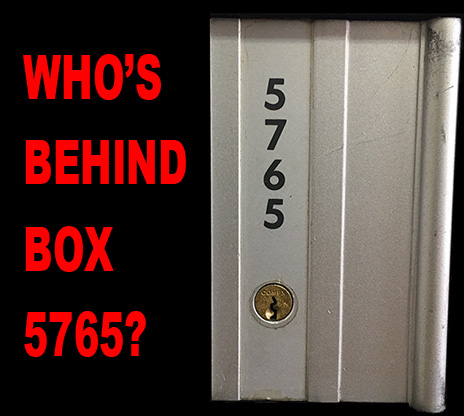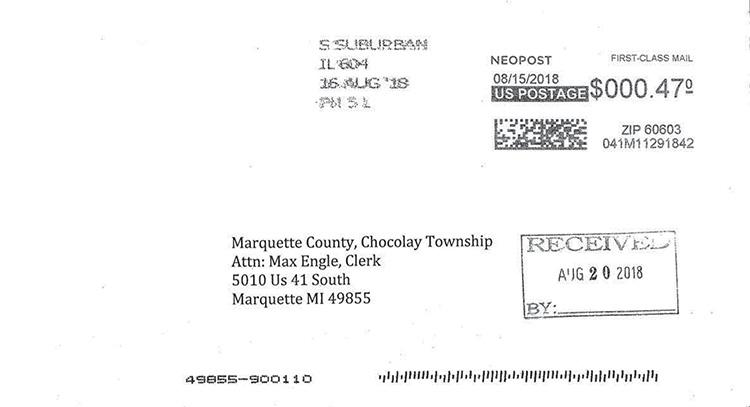Flood Of FOIAs Is A Michigan Mystery
Someone wants copies of each ballot cast in '16

![]()
8/28 UPDATE: A not-for-profit group affiliated with the Democratic Party’s largest super PAC came forward today and revealed it was behind the FOIA spree targeting Michigan voter records. Priorities USA Foundation said it is seeking the ballots as part of a research project. The group, which did not address why it opted for such clandestine methods, is an offshoot of Priorities USA Action, a progressive super PAC that spent more than $125 million in support of Hillary Clinton’s 2016 presidential campaign.
AUGUST 27--The letters began arriving this month at scores of municipal clerk's offices across Michigan, from large cities like Ann Arbor to small communities in the Upper Peninsula.
Citing the state’s Freedom of Information Act, the letters requested paper copies of every ballot cast in the respective jurisdictions “in connection with the November 8, 2016 election for President of the United States.” The request not only sought copies of election day, absentee, and provisional ballots, but also “rejected or spoiled ballots” and copies of the envelopes in which absentee ballots were sent  (with “a visible image of the space for the voter’s signature”).
(with “a visible image of the space for the voter’s signature”).
In all, the two-page FOIA letter detailed 11 separate categories of voting records that were to be provided by government officials. The letter asked that responsive records be “organized by precinct for all precincts in your jurisdiction.”
The FOIA letter rattled many of its recipients, who viewed the expansive request as overly burdensome, especially as they are preparing for the consequential November 6 midterm election.
The timing of the FOIA struck many clerks as odd: 21 months had passed since Donald Trump eked out a 10,000-vote victory over Hillary Clinton to capture Michigan’s 16 electoral votes (more than 4.5 million votes were cast statewide). However, several clerks interviewed noted that the FOIAs arrived weeks before Michigan’s records retention rules would allow them to begin destroying the 2016 election records.
The FOIA request quickly became the hottest topic on the online message board of the Michigan Association of Municipal Clerks. Recipients of the FOIA discussed the difficulty of reproducing ballots that were larger than their copier’s glass scanning bed. Others commented on the unprecedented and “unwieldy” scope of the FOIA. “I am a brand new clerk, and this project is quite overwhelming to me,” wrote Mary Hopkins, city clerk in Grand Blanc (pop. 7888). A Lansing clerk estimated that it would take nearly 300 hours of staff time to process the FOIA, “which will be a struggle until after the election.” In Ann Arbor, where about 61,000 presidential votes were cast, a clerk estimated that the city would have to produce “well over 100,000 pages of copies and they are asking to have it shipped.”
Cost was also a prime topic: The combined bill for all those paper copies would run into the hundreds of thousands of dollars. Some clerks shared their hefty estimates of paper, copying, employee, and mailing costs. “Hoping they realize this is way too expensive,” one clerk wrote.
And then there was the concern voiced by Max Engle, clerk of Chocolay Township, where 4700 votes were cast in November 2016. “Has anyone checked if this organization is legit?” Engle asked. In an interview, Engle said that he believed the FOIA request was a “fraud” and might be an identity theft scheme. He also wondered whether the records requests were intended to disrupt preparations for this November’s elections.
There is much to support the dark suspicions of Engle and other Michigan clerks:
- The FOIA letters were sent by someone identified only as “Emily.” In subsequent e-mail exchanges with Michigan clerks, "Emily" offered no surname or any affiliations.
- Clerks were directed by “Emily” to send any questions to her via Gmail ([email protected]), not at an e-mail address attached to a business domain.
- While “Emily” included a contact phone number--(734)-489-9487--carrying a Flint area code, the Google Voice number could have been subscribed to from anywhere in the U.S..
- The FOIA requests received last week arrived in envelopes with postmarks indicating that the letters were mailed from Chicago, Illinois.
- In her FOIAs, “Emily” directed clerks to send copies of the requested records to a post office (seen above) in Astoria, a neighborhood in New York City’s Queens borough. The documents were to be sent care of “United Impact Group, LLC.” It is unknown, of course, whether material mailed to P.O. Box 5765 might be forwarded elsewhere.
- While no companies named “United Impact Group, LLC” have been formed in Michigan, New York, or Illinois, a firm by that exact name was incorporated on July 19 in Delaware, a haven for corporate secrecy. The business’s registered agent is the Wilmington-based Corporation Trust Company, which specializes in the formation of Delaware companies.
In response to the FOIAs, some municipalities have begun mailing “Emily” letters requesting the upfront payment of half of the estimated cost of processing the records requests. For example, Lisa Glish, clerk in Escanaba, a small port city in the Upper Peninsula, will not start copying ballots until she receives more than $1600 from “Emily.” While questioning the legitimacy of the FOIA request, Glish said that only someone with “deep pockets” could afford the statewide document grab.
While Michigan clerks wait to see if “Emily” sends them checks, at least one jurisdiction has already received a payment from United Impact Group.
In early-June, the city of Mount Clemens received an e-mailed FOIA from “Emily” seeking ballots for a single precinct. The clerk’s office replied that the request would be processed upon receipt of a 50  percent deposit. More than two months passed without a reply from “Emily.” Then, on August 20, the clerk’s office received a check for the full amount required to copy ballots from the single precinct. The Mount Clemens clerk also received “Emily”’s form FOIA letter requesting copies of all ballots cast in Mount Clemens.
percent deposit. More than two months passed without a reply from “Emily.” Then, on August 20, the clerk’s office received a check for the full amount required to copy ballots from the single precinct. The Mount Clemens clerk also received “Emily”’s form FOIA letter requesting copies of all ballots cast in Mount Clemens.
While the check sent to Mount Clemens contained the United Impact Group, LLC name, the firm’s address had been blacked out with a marker. However, when an enterprising clerk’s employee held the check up to a light, the address could be discerned.
United Impact Group purportedly operated from a suite in a Charlotte, North Carolina office building (pictured above). However, the mystery company’s headquarters is actually a “virtual office” operated by Regus, a real estate firm that offers clients services like mail handling and call answering.
“Emily” has not responded to e-mails sent by TSG to her Gmail account or voice messages left on her Google Voice number.
So it remains a mystery why a firm incorporated in Delaware that issues checks from North Carolina is mailing FOIA letters from Chicago requesting that election records from across Michigan be mailed to a New York City P.O. box. (3 pages)








